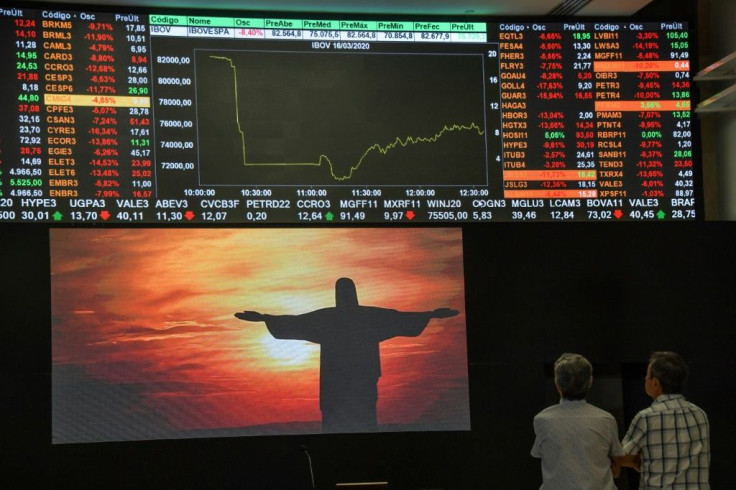Brazil Hikes Interest Rate, Eyeing Inflation
Brazil's central bank raised its benchmark interest rate by 75 basis points Wednesday, continuing to wind down its pandemic stimulus stance in the face of rising inflation in Latin America's biggest economy.
The increase -- the third straight -- brings the Selic rate to 4.25 percent, just shy of its pre-pandemic level of 4.5 percent in January 2020.
The unanimous decision by the nine members of the bank's monetary policy committee was in line with expectations, though some analysts had predicted an even bigger hike of 100 basis points.
The committee said in a statement it expected "another adjustment of the same magnitude" or more at its next meeting, scheduled for August.
"The persistence of inflationary pressure has proven greater than expected," it said.
The central bank is increasingly worried over rising prices, which it has indicated it sees as a bigger threat to the economy than a new slowdown due to Covid-19, even though the latter is still raging in Brazil.
The annual inflation rate came in at 8.06 percent in May, well above the bank's target range of 2.25 to 5.25 percent.
Economic growth meanwhile hit a stronger-than-expected 1.2 percent in the first quarter of the year, returning the economy to its pre-pandemic level.
That has policy makers looking more nervous over inflation than growth as they navigate the traditional trade-off between the two.
"It's safe to say the committee's statement was hawkish," Etore Sanchez, chief economist at Ativa Investimentos, told AFP.
"The monetary policy committee said the pace of rate increases is adequate, but also left the door open to a 100-basis-point increase at its next meeting."
Inflation is being fueled by the worst drought in nearly a century in Brazil's southeast and central-west, which has sapped the hydroelectric dams the country relies on for nearly two-thirds of its electricity capacity, causing energy prices to surge.
Earlier Wednesday, the Brazilian real strengthened to 4.99 to the dollar, breaking the barrier of five for the first time in a year on expectations the bank would raise the rate.
The central bank has now hiked the Selic rate by 75 basis points three straight times since March, after slashing it to an all-time low of two percent in response to the pandemic.

Brazil's economy is coming off a record 4.1 percent contraction in 2020.
But that was less than feared at the height of the pandemic implosion, and better than many other economies.
And the recovery has been surprisingly strong so far.
Expectations are now for GDP growth of 4.85 percent this year, according to the central bank's weekly poll of analysts.
That is up from a forecast of 3.04 percent two months ago, when the country was being battered by a second wave of Covid-19.
However, the pandemic threat is far from over.
Covid-19 has claimed nearly 500,000 lives in Brazil, second only to the United States.
And while the death toll has slowed since April, it is still rising by nearly 2,000 lives lost a day in Brazil, among the highest rates in the world.
The country's Covid-19 vaccination campaign has meanwhile been hit by shortages and delays.
About 11 percent of Brazil's 212 million people have been fully vaccinated.
Far-right President Jair Bolsonaro faces criticism for his management of the pandemic, including initially refusing offers of vaccines.
Epidemiologists warn Brazil may now be on the brink of a third wave of Covid-19.
But markets "are already seeing the pandemic as a thing of the past," said economist Mauro Rochlin of the Getulio Vargas Foundation.
"The country is focused on fast growth," he said, "not what the government is doing" on the pandemic.
The recovery has not reached all Brazilians, however.
The unemployment rate hit a record 14.7 percent in the first three months of the year.
© Copyright AFP 2024. All rights reserved.











